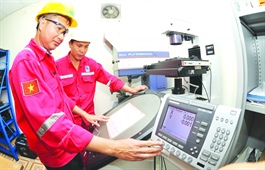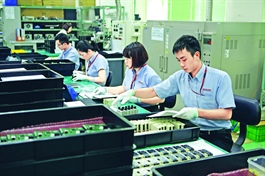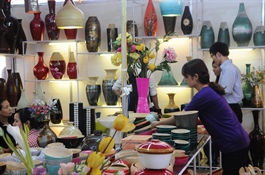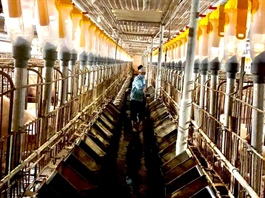Tech upgrades lend to thriving food prospects
Tech upgrades lend to thriving food prospects
New cutting-edge technologies are becoming an essential factor for modern and sustainable groups in agriculture and food sectors to maintain high productivity.
At last week’s Thaifex - Anuga Asia 2022 event in Bangkok, ProfilePrint COO Ellis Chua highlighted the lack of consistency in food ingredients in terms of sensory and quality parameters, which costs the industry millions of US dollars annually.
“Ensuring quality, consistency of ingredients, and shortening the product development cycle is essential to any food business. Current methods can be costly and heavily dependent on expert human judgment,” said Chua.
ProfilePrint is a Singaporean company focusing on the rapid assessment of food ingredients powered by AI. It empowers regular users to perform the role of an expert, without the need for technical know-how or expensive lab equipment. Using advances in AI and sensor technology, it creates a unique digital food fingerprint for samples within seconds.
For verticals such as tea, coffee, grain, cocoa, herbs and spices, and more, common factors used to determine their quality that people check are the uniformity and the amylose content. In addition to human sensory or testing one item at a time, applying AI and near-infrared spectroscopy (NIS) equipment has contributed to managing the quality of tonnes of items easily and quickly.
“With a combination of sensor technology and pattern recognition, ProfilePrint’s rice grain model leverages this spectroscopy to tackle consistency challenges and provide good prediction results,” said Chua.
In husbandry companies, AI and NIS have supported the management of the quality of input materials and output products, particularly in animal feed production, where tens of tonnes of various seeds are processed every day.
“These cutting-edge technologies have enabled us to optimise the nutritional value of our portfolio of ingredients without compromising on taste and quality,” said Marcel Smits, chairman of Cargill Asia-Pacific. “Cargill is keen to leverage the application and technologies to take the connection between nutrition and health to the next level.”
AI and NIS are useful for processing and manufacturing, added Vivek Verma, managing director of Coffee at Olam Food Ingredients. “The technology could significantly expedite the quality assessment process to benefit the entire value chain - from farmers to roasters,” Verma said.
“We also see the potential of deploying this solution beyond coffee and into other differentiated food ingredients such as cocoa, nuts, spices, and dairy.”
Such solutions have been increasingly important during the last two years when companies were restricted from sending trusted staff to source and carry out quality inspections.
“AI and NIS technologies have allowed an objective snapshot of quality to be obtained reliably, remotely, and digitally, ensuring trust is maintained in the supply chain, especially in international trade,” urged Tan Toi-Ngee, head of innovation at Golden Energy and Resources, which is part of Indonesian conglomerate Sinar Mas Group.
In Vietnam, AI technology combined with Internet of Things sensor devices is being applied in the agricultural industry. According to MarketandMarkets, the value of AI in agriculture is estimated to grow from $1 billion in 2020 to $4 billion in 2026 with a compound annual growth rate of 25.5 per cent in that time.
By analysing different data sources such as temperature, humidity, weather, and historical crop performance, AI in the agricultural sector can help automatically generate warnings and forecasts, make better predictions about the weather as well as the country’s environmental conditions that directly affect the growth of crops, crops, in the process of farming and production.
Applying AI in agriculture also helps to analyse data in real-time, contributing to helping farmers detect and control pests, as well as monitor appropriate water use and soil conditions.
Hundreds of companies joined Thaifex and showcased cutting-edge machines manufactured by CWM Automation, Sripipat Engineering, ABL, and more from both Asian and European countries.
“I am so amazed by the machines and technological solutions in the exhibition, which have been upgraded so much compared to the previous exhibitions,” said Nguyen Thanh Hoa from EUBIZ, a Vietnamese cashew exporter. “They will enable us to cut down human labour, enhance performance and productivity, and manage the quality of products. They have their own advantages and solutions, so we have a headache trying to choose the best suppliers and the best technologies.”
Thaifex - Anuga Asia 2022, Asia’s leading food tradeshow, took place on May 24-28 and featured 11 food segments, 1,600 exhibitors, 2,500 high-profile buyers, and 75,000 trade visitors in the food and beverage sector.
The exhibition also highlighted the biggest trends in the sector, market segments and opportunities, rising levels of product innovation, and emerging and growing trends in the post-pandemic era.
The event is projected to generate total purchase orders of over $290 million to boost the local economy.























